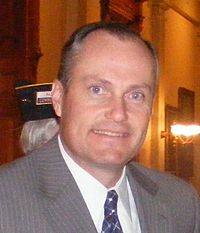Lt. Gov. Casey Cagle said Wednesday that parents in Georgia should not have to fear prosecution if they use medical marijuana derivatives to treat their children who suffer from intractable seizures.
He told reporters, “I’m calling upon every prosecutor in the state not to prosecute families” that possess cannabidiol (CBD) oil, a non-smokable, non-psychoactive derivative of marijuana, for use with their children.
Cagle made his remarks on medical marijuana at a state Capitol news conference to discuss the prevalence of autism and the Georgia Senate’s efforts to mandate private insurance coverage for the condition.
The Republican lieutenant governor’s surprise remarks addressed the medical marijuana legislation that failed during the 2014 General Assembly session. The House bill would have provided parents immunity from state prosecution for using CBD oil in Georgia.
The legislation however, recognized that people would have to get the CBD oil in another state where medical marijuana is legal and would risk arrest by federal authorities in transporting it back to Georgia.
Twenty states have legalized medical marijuana, and two, Colorado and Washington, have legalized medical and recreational marijuana. But federal laws against marijuana remain.
Cagle told GHN that he had talked with district attorneys, and he said they have no interest in prosecuting parents with CBD oil.
The state’s prosecutors had affirmed that same position during consideration of the House legislation, which was sponsored by Rep. Allen Peake. The Macon Republican was inspired by the plight of children with intractable seizures whose condition has been helped significantly by CBD oil, according to parents and physicians.
Peake, contacted by GHN, said he was not surprised by Cagle’s comments. “I believe Lieutenant Governor Cagle got it,” Peake said. “We need to do something for these families, and I believe he’ll be helpful in the next legislative session in accomplishing that objective.”
But Peake said he does not think Cagle’s remarks will result in families feeling comfortable about getting CBD oil another state, such as Colorado, and bringing it back to Georgia.
Peake noted that immunity from prosecution “is not in the law” here, so there are no official protections for Georgia parents despite the comments of some officials. “It leaves families in legal limbo,” he said.
Cagle and the Senate were criticized by parents of children with seizures during the General Assembly session, which ended March 20, for refusing to adopt the medical marijuana legislation unless it included another bill, sponsored by Sen. Renee Unterman (R-Buford), which mandated private insurance coverage for children with autism.
The House, for its part, refused to pass the private insurance mandate for coverage of an autism therapy, which although expensive has shown to be effective when children receive the treatment at an early age.
Both Cagle and Unterman were questioned by reporters on whether they had any regrets for making passage of the medical marijuana legislation contingent on House adoption of the autism bill, since both measures wound up failing.
“I’m sorry for the way things worked out,” Unterman said, adding that she looks forward to working with the House and Senate on both efforts.
She added, however, that “we felt we had the votes in the House” to pass the combined bill during the recent session.
“There were only 15 to 20 who would vote against it,” she said.
Peake challenged that assertion. “I don’t know if that’s totally accurate,” he said. “The core issue is that the bills shouldn’t have been attached. They should have been debated separately.”
Cagle also apologized for the failure of the medical marijuana bill.
“I’m sorry we weren’t able to do something that was impactful for” the children, he said.
But he noted that the state will continue to work on medical marijuana through a House and Senate study committee. Among the other initiatives under consideration, he said, is a state depository of medical marijuana derivatives.
The news conference was called not only to highlight the need for insurance coverage of autism therapy in Georgia, but also to recognize that Wednesday was World Autism Awareness Day.
Unterman said new CDC data show that the prevalence of the disorder is significantly greater than previously thought.
The CDC has reported that 1 in 68 children suffer from autism.
Although the insurance mandate for autism was not adopted, Unterman said the state’s FY 2015 budget includes $2.4 million for coverage of treatment in the State Employee’s Health Plan.
The budget also includes $250,000 for the Department of Public Health to conduct outreach around the state for early detection of autism in children and another $240,000 for services to help families of autistic children cope with the disease.


